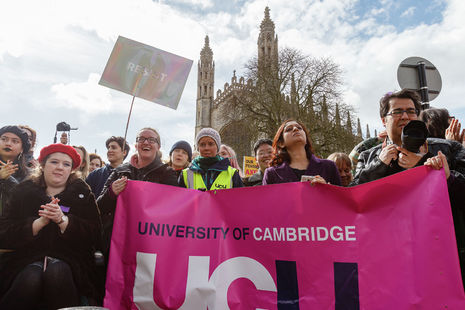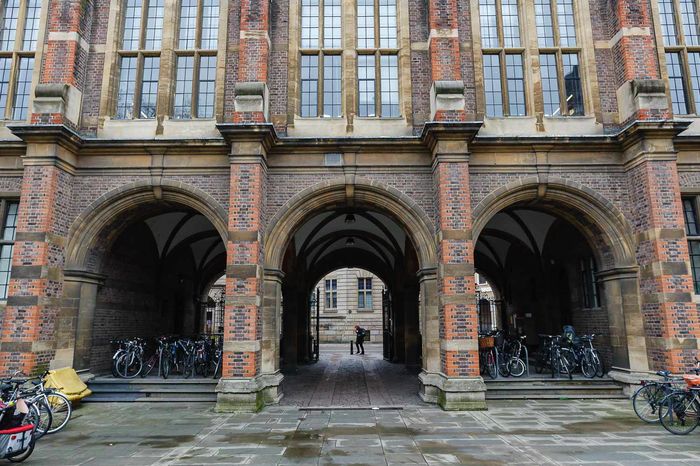Uni’s gender pay gap widens to 13%
The median gender pay gap among central University academics went up by almost 3% in 2024

Female staff at the University of Cambridge are now paid 13.2% less on average than their male counterparts, with the gender pay gap returning to its highest level in 2024 since 2019.
According to the University’s annual Equality, Diversity, and Inclusion (EDI) report, the median gender pay gap among central University staff went up by almost 3% in 2024 from 10.4% in 2023.
Although the gap fell from 13.2% in 2019 to 8.4% in 2022, the latest rise marks the second year in a row it has increased.
A spokesperson for the Cambridge University and College Union (UCU) told Varsity: “We are deeply disappointed to see this worrying trend of an increasing gender pay gap and we urge the University to take action to address it.”
“Our members have repeatedly highlighted to us how structural problems such as the University’s reliance on casualised labour and poor access to childcare facilities interact with more overt forms of discrimination to put women, disabled and BME staff at a disadvantage in terms of pay, pensions and career progression,” they added.
Nowsha Farha, the Students’ Union’s Women’s Officer, told Varsity: ”The recent rise in the gender pay gap up to a post-2019 high of 13.2% is concerning. These figures highlight that while some progress may have been made in the past, it is important to maintain and sustain long-term positive changes through targeted, effective and continued action.
“It serves as a reminder that progress is not linear and we must ensure that changes are embedded into the attitude, culture, systems, structures and Policies,” Farsha continued.
A spokesperson for the University of Cambridge told Varsity that “The University is committed to tackling gender disparity. The main contributing factor within the University is that the distribution of people in different positions is not balanced, rather than people in the same positions being paid differently. This core issue is something we are actively working to address, and we are currently undertaking a detailed analysis of the University’s gender pay gap to identify its root causes and the interventions required to close it.”
In February, Varsity reported that the gender pay gap among Cambridge staff is 22.63% wider in the central University than in its colleges. On average, female academics at 19 responding colleges earn 10.32% more than their male colleagues, whereas in the central University, women earn 12.31% less than men.
The report also found that, among the central University’s six academic schools, the School of Humanities and Social Sciences recorded the widest gender pay gap at 11.66%, followed by the School of Technology at 10.35% and the School of Physical Sciences at 7.66%. Meanwhile, the School of Biological Sciences had the smallest gap at 5.18%.
Earlier this month, a report by the University’s Research on Research team demonstrated that structural disparities – particularly in seniority and disciplinary distribution – drive gender imbalances in grant funding at Cambridge.
The study, covering over 23,000 grant applications between 2015 and 2023, showed that women at Cambridge apply for around 10% fewer research grants than men, and when they do apply, their grant applications are on average 7% smaller in value. However, once academic seniority and departmental affiliation are taken into account, these gender disparities largely disappear.
In 2023, the University drew up a global Gender Pay Gap Action Plan which committed to measures such as “diversifying recruitment, promoting flexible working options, levelling roles and advertising them with pay ranges to increase transparency, and expanding our gender pay gap reporting in the locations where we have the numbers of employees to make such reporting meaningful”.
Despite this, a November report from the Higher Education Policy Institute found that women are less likely than men to achieve first-class degrees at Oxbridge than at other universities due to “combative and confrontational” teaching styles, examination-based assessments, and a lack of female representation.
According to the report, at Cambridge, theology had the largest first-class degree attainment gap on average at Cambridge over the last decade, with a 20.6 percentage difference, followed by Mathematics (20.1%) and Archaeology (15.7%).
That same month, Varsity reported that white Cambridge academics are paid almost 6% more than BME colleagues as of October 2024, marking the third consecutive year that the ethnic pay gap across all staff had increased.
 News / Colleges charge different rents for the same Castle Street accommodation2 March 2026
News / Colleges charge different rents for the same Castle Street accommodation2 March 2026 News / King’s hosts open iftar for Ramadan3 March 2026
News / King’s hosts open iftar for Ramadan3 March 2026 Theatre / Lunatics and leisure centres 4 March 2026
Theatre / Lunatics and leisure centres 4 March 2026 News / Angela Merkel among Cambridge honorary degree nominees27 February 2026
News / Angela Merkel among Cambridge honorary degree nominees27 February 2026 News / News in Brief: waterworks, wine woes, and workplace wins 1 March 2026
News / News in Brief: waterworks, wine woes, and workplace wins 1 March 2026








